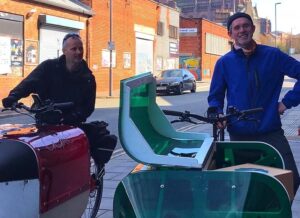Liverpool’s first vertical farm Farm Urban believes the Covid-19 pandemic has highlighted the food industry model is unsustainable.
They are pushing for a transition from a linear to a circular economy to produce better quality food that benefits the environment.
A circular economy is a system aimed at eliminating waste so there is a continual use of resources.
Abigail Blackburn, Farm Urban’s Marketing Coordinator, said: “I think in a national and even global food system there will be a focus on building more sustainable structures.
“This will keep resources in use for longer but also focus on matters such as food miles and waste.
“The pandemic has shown our food system is highly vulnerable to external changes in our environment.”
The non-profit organisation grows some of the freshest, most nutritious food on the planet.
They use no pesticides, only natural nutrients and 90% less water than commercial farming.
Their Greens for Good project shares the importance of sustainable food growth by providing education to schools and communities.
“We’re trying to show this way of growing should be applicable to all city regions.
We aim to empower and enable everybody to choose and live healthier lives, as well as developing valuable skills and improving food literacy as well,” Ms Blackburn said.
How have they adapted?
Since the pandemic they have adapted their model to support vulnerable groups across the city.

“When businesses closed we lost a major source of our revenue and potential customers.
“To fund our activity beyond surplus donations we launched a home delivery service in partnership with Agile Liverpool.
“For every box sold we support the delivery of another to a vulnerable individual or supporting organisation so this circular system we want to achieve can continue,” Ms Blackburn said.
People who are shielding, children on free school meals, homeless shelters and food banks have all benefited from their donations.
Through funding opportunities given to them across the Liverpool City region, they have increased the capacity of their farm from 40 to 100%.
“We’ve had an amazing response to home delivery boxes across Liverpool.
“A lot of our community partners say they’ve had a huge increase in attention and engagement.
“The responses we’ve generated over the past year reflects that people, businesses and organisations are becoming more aware for their actions towards creating a more sustainable future,” Ms Blackburn finished.
Find out more about Greens for Good’s work here.
To find out how you could secure funding to help your own community become more sustainable, read here.
Feature Image by Greens for Good.












